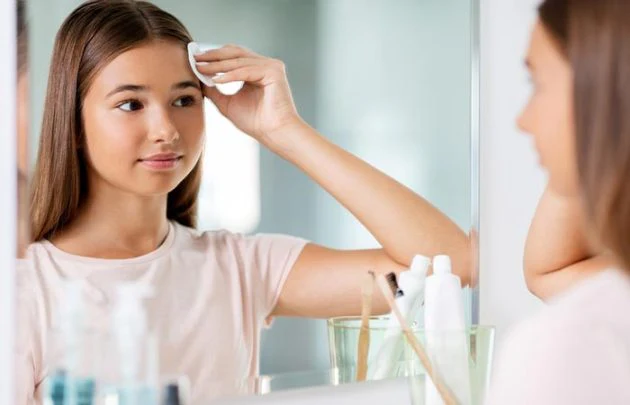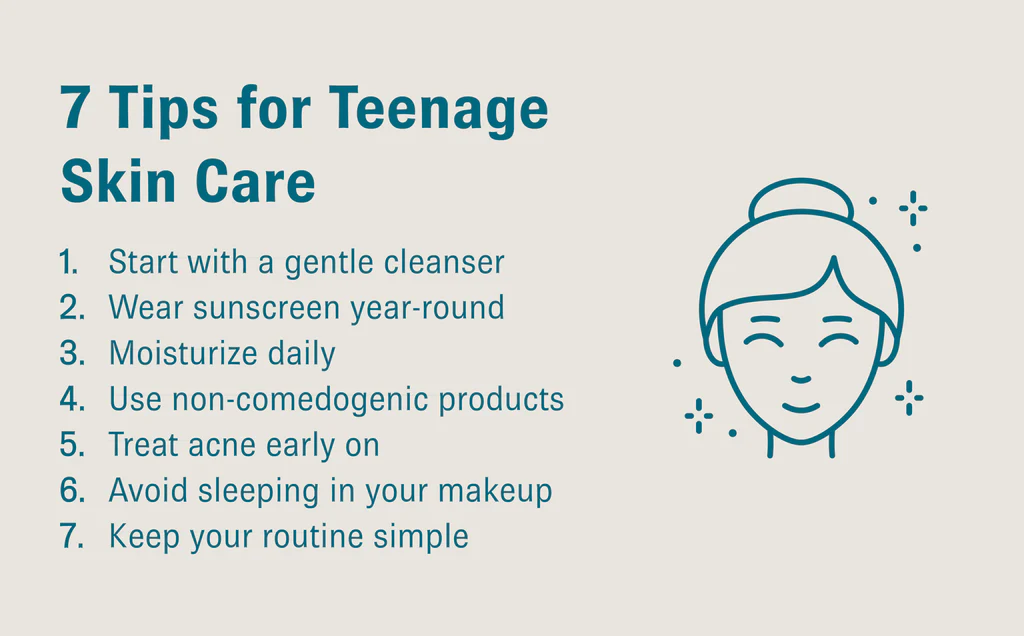
Teen skin undergoes hormonal shifts during puberty that increase oil production, leading to acne, blackheads, and sensitivity. A consistent, simple skincare routine gentle cleansing, lightweight moisturizing, and daily sunscreen helps balance oil, prevent breakouts, and support long-term skin health.
Key Takeaways
- Hormonal changes increase sebum, causing acne and uneven texture.
- Consistency matters more than using expensive or complex products.
- Use non-comedogenic, fragrance-free, gentle formulas for teenage skin.
- Maintain morning and night routines with cleansing, moisturizing, and SPF.
- Avoid over-washing, harsh scrubs, and unsafe home remedies.
- Hydration, balanced diet, adequate sleep, and stress control improve skin clarity.
- Patch test new products; consult dermatologists for persistent acne or reactions.
- Build habits early for long-term, healthy, confident skin.
Understanding Teenage Skin
Teen skin undergoes significant changes during puberty because of hormonal activity. These hormones increase oil production, which can make the skin oily and more likely to develop acne, blackheads, and whiteheads. Besides hormones, genetics influence how your skin looks and reacts.
Knowing how these factors affect your skin helps teens choose the right products and routines to keep skin clear as it adjusts through this phase. Awareness of how hormones affect skin health is particularly important for managing breakouts.
Essential Daily Skin Care Tips for Teenagers
A daily routine is key to strong skin health for teenagers. Consistency matters more than expensive products.
Morning Routine
Start your day with simple steps that protect and refresh:
- Use a gentle cleanser to remove overnight oil and sweat: During sleep, your skin produces oils and can accumulate sweat and dirt. A gentle cleanser removes these without stripping your skin’s natural moisture, helping to prevent clogged pores and breakouts.
- Pat your skin dry softly with a towel to avoid irritation: Instead of rubbing your face, which can irritate and damage sensitive skin, gently patting it dry helps maintain the skin’s protective barrier and reduces redness or inflammation.
- Apply a light, non-greasy moisturizer suited for your skin type: Moisturizing keeps the skin hydrated and balanced. Choosing a lightweight, non-greasy formula prevents excessive oiliness or heaviness, which is important for teens who often have oily or combination skin.
- Finish with sunscreen to protect your skin from harmful UV rays, even on cloudy days: Sunscreen shields your skin from ultraviolet rays that can cause damage, premature aging, or dark spots. UV rays can penetrate clouds, so applying sunscreen daily is essential for ongoing skin protection.
Night Routine
Let your skin recover while you sleep:
- Wash your face again to remove dirt and buildup from the day: Throughout the day, your skin collects dirt, oil, sweat, and pollutants. Washing your face at night removes these impurities, preventing clogged pores and reducing the risk of acne and irritation.
- Use a lightweight night moisturizer to support skin repair: Nighttime is when your skin naturally repairs and regenerates. Applying a lightweight moisturizer helps keep the skin hydrated without feeling heavy or greasy, supporting this natural healing process.
- Try spot treatments only if you have breakouts or rough patches: Use targeted treatments specifically for pimples or rough skin areas rather than applying strong products all over your face. It’s best to choose formulations designed for teenage skin to avoid irritation and achieve effective results.
Product Selection for Teen Skin
Choosing skin care products as a teenager can be confusing with so many options available. Focus on these essentials to simplify your choices:
- Look for non-comedogenic products that won’t clog pores.
- Avoid harsh chemicals, heavy fragrances, or aggressive formulations.
- Affordable, pharmacy grade products often work as well as luxury brands.
- If using natural or herbal options, patch-test first. Learn more about natural and synthetic skincare for safe choices.
- Consider gentle serums or retinol for skin care only under guidance and for early signs of aging or acne scars.
Addressing Common Teenage Skin Problems

Teen skin problems aren’t all the same. A targeted approach helps each concern.
- Acne: Use cleansers with mild ingredients like salicylic acid or benzoyl peroxide, but don’t overdo it. Treat early to prevent scars.
- Blackheads and Whiteheads: Apply gentle exfoliators once or twice a week. Avoid squeezing or picking.
- Oily Skin: Look for oil-free, lightweight products. Blotting sheets can manage shine.
- Dry or Sensitive Skin: Use gentle, fragrance-free moisturizers and avoid over-cleansing.
- Masks: For extra hydration and radiance, try facial masks for glowing skin occasionally.
Nutrition, Lifestyle, and Skin Health
Healthy skin begins with good habits inside the body. Teens can improve their skin by adopting these lifestyle practices:
- Drink enough water daily to keep skin hydrated and flush out toxins.
- Eat a balanced diet rich in colorful fruits and vegetables, which provide essential vitamins and antioxidants for skin repair and glow.
- Get enough sleep each night to allow the skin to rest and regenerate.
- Manage stress through activities like exercise, meditation, or hobbies, since stress can cause or worsen acne and other skin issues.
Myths and Mistakes in Teen Skin Care
Understanding skincare mistakes helps teens prevent long-term skin damage. Here are additional myths and mistakes that teens should watch out for:

- Believing oily skin doesn’t need moisturizer often leads to increased oil production and more breakouts.
- Using toothpaste or kitchen ingredients to treat pimples can irritate the skin, making problems worse.
- Thinking skincare products will show results overnight may lead to impatience and switching products too quickly. Most products need consistent use over weeks.
- Skipping regular face washes because you don’t see dirt; invisible oil and bacteria can still clog pores and cause acne.
- Sharing makeup or skincare products with friends can spread bacteria and cause breakouts or infections.
- Blaming all skin problems on hormones, while hormones play a big part, poor habits or allergies can also affect skin health.
- Ignoring reactions like redness, stinging, or rashes and continuing the same routine can damage your skin further.
- Washing your face more often will not clear acne and can dry out or irritate your skin.
- Strong homemade remedies without proper research may cause redness or damage.
- Trying too many products at once can overwhelm skin and lead to breakouts.
- Expensive products are not always better, simple, well-chosen pharmacy items often work just as well.
- Skipping sunscreen is a mistake, sun protection is necessary every day, even indoors or in cloudy weather.
- Picking or squeezing pimples makes them worse and can cause scars.
- Believing all “natural” or herbal products are safe, always check for allergy risks.
Advanced Tips for Targeted Concerns
Some skin issues need more specific care than basic routines. Here’s how teens can handle stubborn or special concerns with focused solutions:
- Use spot treatments with proven ingredients like benzoyl peroxide or salicylic acid to quickly target breakouts.
- For early signs of marks or pigmentation, try gentle serums designed for teens and free from harsh chemicals.
- If you play sports or sweat a lot, wash your face after activities to clear away sweat, dirt, and bacteria that can cause blocked pores or rashes.
- Always follow the package instructions for every product to avoid overuse and irritation.
- Watch your skin closely for reactions, and stop using anything that causes redness, itching, or discomfort.
Safety, Allergies, and Dermatologist Advice
Protecting your skin involves being cautious with new products and understanding when to seek professional help. Testing products on a small skin area first can prevent allergic reactions or irritation on the face. Monitoring your skin’s response over time is essential. If you experience worsening conditions, persistent pain, or no improvement despite your efforts, consulting a dermatologist is the best step. Dermatologists provide expert care for severe acne, allergic reactions, and skin concerns that do not improve with regular routines.
- Always perform a patch test on your arm or behind your ear before using new products on your face.
- Stop using any product that causes redness, itching, swelling, or pain.
- Avoid mixing too many new products at once to identify which one causes a reaction.
- Consult a dermatologist if skin problems persist, worsen, or cause discomfort.
- Seek professional advice for severe acne, allergic skin reactions, or unexplained rashes.
- Follow all dermatologist recommendations carefully for the best results.
Conclusion
Teenage skin changes due to hormones, causing issues like oiliness and acne. Consistent care with gentle cleansers, lightweight moisturizers, and sunscreen is key. Nighttime routines support skin repair with cleansing and spot treatments for breakouts. Choose non-comedogenic, gentle products and avoid harsh chemicals. Healthy skin also depends on hydration, balanced diet, sleep, and stress control.
Avoid common skincare myths and don’t overuse products. For persistent problems, use targeted treatments and consult a dermatologist. These expert guidelines help teens maintain clear, healthy skin and build long-lasting habits.
FAQ
What is the best face wash for teenage skin?
Look for a mild, fragrance-free cleanser like a gentle foaming wash.
How often should teens wash their face?
Twice daily is enough, morning and evening.
Are acne creams safe for teenagers?
Most over-the-counter creams are safe if used as directed, but always check with a doctor or dermatologist for severe acne.
Is makeup harmful to teenage skin?
Makeup is safe if it’s labeled as non-comedogenic and you remove it at night.
Can teens use adult skincare products?
Stick to formulas meant for young, sensitive skin unless advised by a dermatologist.
How do I know if I need to see a dermatologist?
If you have severe or painful acne, lasting rashes, or reactions to products, a dermatologist should be consulted.
What foods should teens avoid for clear skin?
Limit processed foods and sugary snacks, focus on fruits, vegetables, and plenty of water.
What’s the fastest way to get rid of pimples?
Use spot treatments with salicylic acid or benzoyl peroxide, and never pick at spots.
Why is sunscreen important for teenagers?
Sunscreen prevents early aging and protects against sun damage, even on cloudy days.
How do hormonal changes affect teenage skin?
Hormones boost oil production, often causing breakouts and uneven skin tone.
Reference
- KidsHealth Tips for Better Skin:
https://kidshealth.org/en/teens/tips-better-skin.html - Mayo Clinic Health System Managing Teen Acne:
https://www.mayoclinichealthsystem.org/hometown-health/speaking-of-health/tips-for-managing-teen-acne - CeraVe Skincare Routine for Teenagers:
https://www.cerave.com.au/blog/everyday-skin-care/skincare-routine-for-teenagers - L’Oréal Paris Skincare for Teens:
https://www.lorealparisusa.com/beauty-magazine/skin-care/skin-care-essentials/skin-care-for-teens - Boots Dos and Don’ts of Teen Skincare:
https://www.boots.com/skincare-beauty-advice/skincare-advice/skin-concerns/mythbusting-teenage-skincare
Aubrey Carson is an RDN with 9 years across hospital, outpatient, and private practice settings. They earned an MS in Clinical Nutrition from Tufts University – Friedman School (2016) and completed a Dietetic Internship at Mayo Clinic. Aubrey specializes in micronutrient assessment, evidence-based supplementation, and patient education. Their work includes CE presentations for the Academy of Nutrition and Dietetics and collaborations with Mass General Brigham on nutrition education resources.

